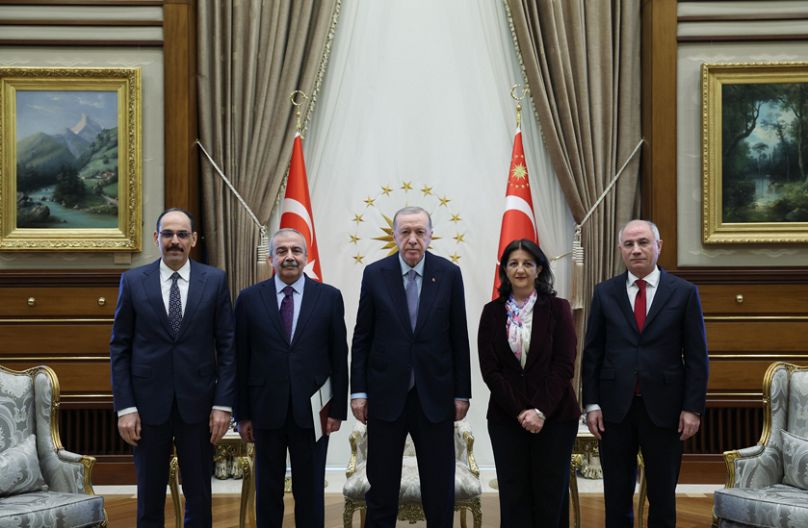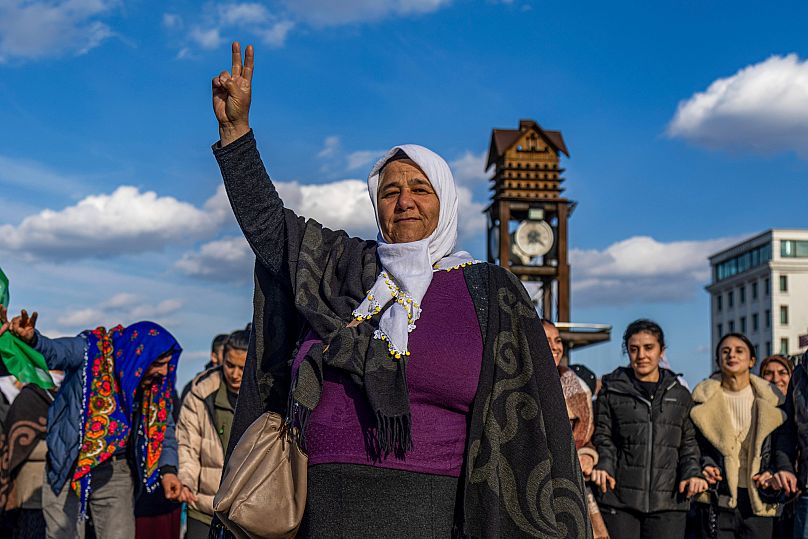The recent PKK ceasefire came against the backdrop of fundamental changes in the region, including the reconfiguration of power in Syria, the weakening of Hezbollah in Lebanon and the Israel-Hamas war in Gaza.
Turkish President Recep Tayyip Erdoğan has held a first meeting with pro-Kurdish politicians who are working to bring an end to the 40-year insurgency between the state and Kurdish militants.
Erdoğan met Pervin Buldan and Sırrı Süreyya Önder, parliamentary deputies for the Peoples’ Equality and Democracy Party (DEM) at the presidential palace in Ankara.
“It was a very positive meeting, it went well. We are much more hopeful,” Önder said.
Prior to the meeting Önder said they would present the current state of peace talks to Erdoğan, adding that they believed the pace of negotiations would increase.
Also present at the more than one hour meeting were intelligence chief Ibrahim Kalin and Efkan Ala, the deputy chairperson of Erdoğan’s ruling AK Party.
This was the first direct contact between Erdoğan and pro-Kurdish party representatives since 12 June 2012, when he was Turkey's prime minister.
Buldan and Önder have been among those to visit the imprisoned leader of the Kurdistan Workers’ Party (PKK), in a bid to build a framework to end the fighting that has caused tens of thousands of deaths in Turkey.
Abdullah Öcalan, whose PKK is listed as a terrorist organisation by Turkey, as well as the EU and most Western states, called for the group to disband and disarm in late February.
Days later the PKK announced a ceasefire.
The PKK appealed for Öcalan to be released from the island prison where he has been held since 1999 to “personally direct and execute” a party congress that would lead to the group's dissolution.
Erdoğan at the time described developments as an "opportunity to take a historic step toward tearing down the wall of terror" between Turks and Kurds.
Since then little concrete progress has been made, with the government not publicly offering any incentives or proposals to the PKK.
Instead, the Turkish military has kept up its campaign against PKK insurgents in northern Iraq while Turkish-backed Syrian groups fight PKK-linked militants in northeast Syria.
The PKK's ceasefire came against the backdrop of fundamental changes in the region, including the reconfiguration of power in neighbouring Syria after the toppling of President Bashar Assad, the weakening of Hezbollah in Lebanon and the Israel-Hamas war in Gaza.
It also followed judicial pressure on the DEM Party, with several of its mayors being removed from office in recent months and replaced by government appointees.
Some believe the main aim of the reconciliation effort is for Erdoğan's government to garner Kurdish support for a new constitution that would allow him to remain in power beyond 2028, when his term ends.
The ceasefire is the first sign of a breakthrough since peace talks between the PKK and Ankara broke down in the summer of 2015.
The PKK insurgency started in the early 80s, initially presenting itself as part of a global communist revolution and demanding an independent Kurdish state.
Those aims evolved over time before settling on demands for equal rights and greater autonomy for Turkey’s Kurdish population.













